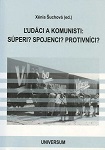Postoj HSĽS k podpisu československo-sovietskej zmluvy z roku 1935
Hlinka’s Slovak People’s Party’s Attitude to the Czechoslovak-Soviet Treaty of 1935
Author(s): Róbert Arpáš
Subject(s): Political history, Recent History (1900 till today), Interwar Period (1920 - 1939), History of Communism
Published by: Historický ústav SAV
Keywords: Slovak People´s Party; Czechoslovak-Soviet Treaty of 1935;
Summary/Abstract: From 1922 on, the Czechoslovak-Soviet diplomatic relations were modified by the Provisional Treaty which, however, did not represent the de iure status. The situation changed in the 1930s in the context of international political affairs. After the diplomatic de iure recognition of the Soviet Union by Czechoslovakia on 9 June 1934, the new Czechoslovak-Soviet Treaty – now a treaty between allies – was signed on 16 May 1935. The orientation of the Czechoslovak foreign policy towards Moscow was refused by Hlinka’s Slovak People´s Party (HSPP). They doubted the possibility of identifying the Soviet Union with a role of the peace actor and internationally responsible partner. It feared that the agreement was only the first step to the goal of Communists – the world revolution, proletarian dictatorship and government of the Soviets in Europe. The Party carefully observed and critically commented on the deepening of the relationship between Prague and Moscow. Instead of the orientation towards Moscow, they preferred a close co-operation with the Catholic and Slavic Warsaw. But Poland regarded Czechoslovakia as a regional competitor and was not interested in a correct relationship. The HSPP was not able to recognize the real aims of Poland at the international scene and to produce their own realistic concept of foreign policy.
Book: L'udáci a komunisti: Súperi? Spojenci? Protivníci?
- Page Range: 102-107
- Page Count: 6
- Publication Year: 2006
- Language: Slovak
- Content File-PDF

